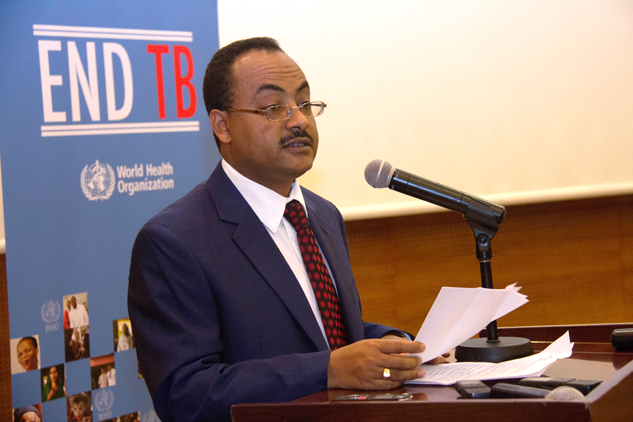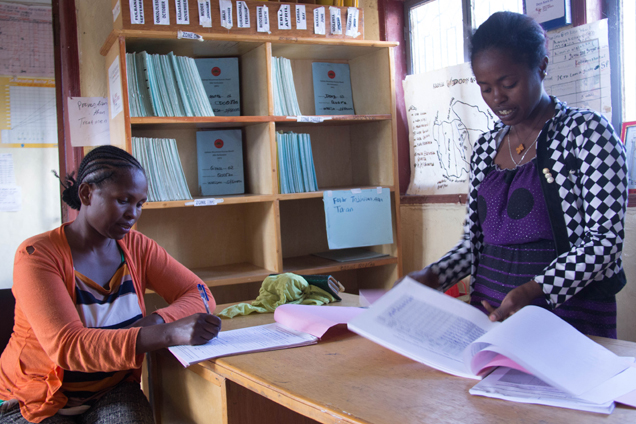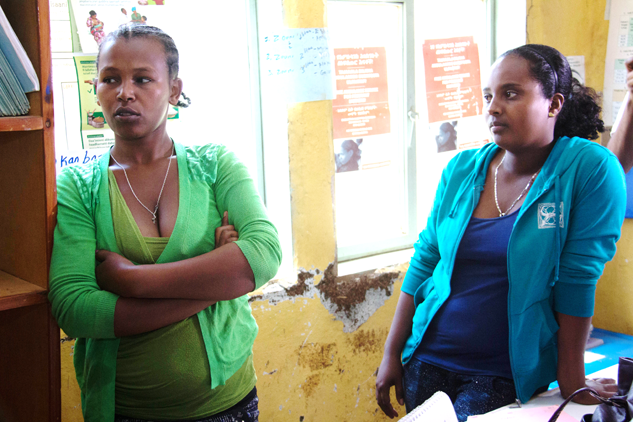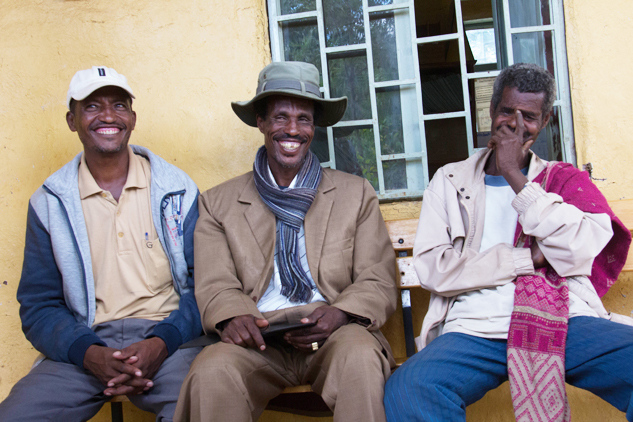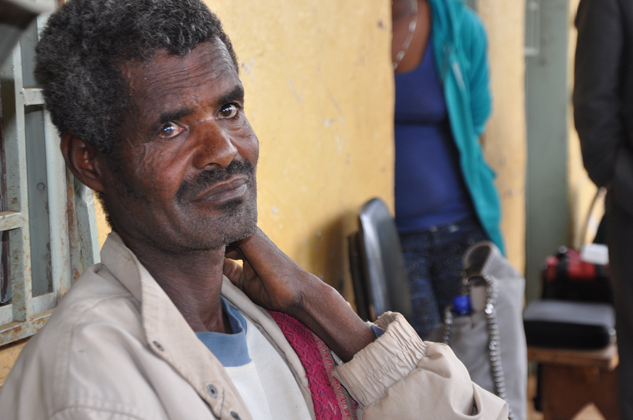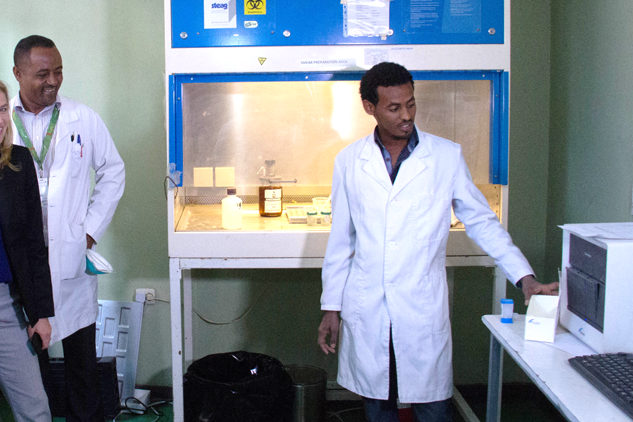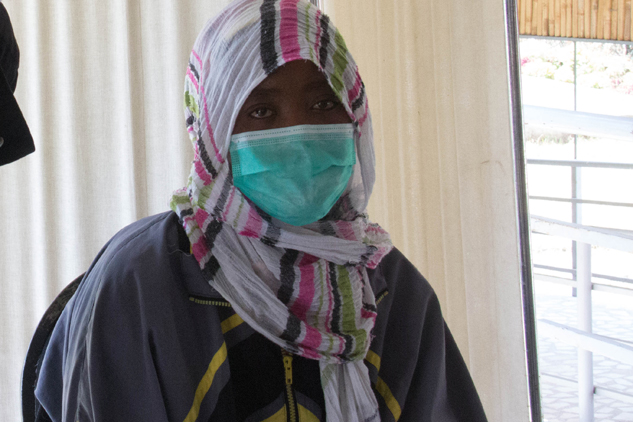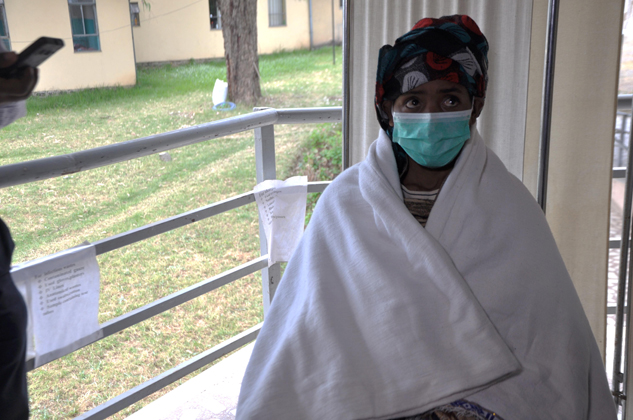2016 marks the beginning of the Sustainable Development Goals (SDG) era. Ethiopia is making progress in tackling tuberculosis (TB), the leading infectious disease killer along with HIV. It is committed to reaching the SDG target of ending TB by 2030 and has fully integrated WHO’s End TB Strategy – the new roadmap for countries to end this deadly disease - into its National TB Strategic Plan.
WHO/N. Tesfaye
Ethiopia’s Health Minister, Dr Kesetebirhan Admasu, has said that wiping out the TB epidemic will be possible only with strong political commitment and the engagement of communities. When we look at Ethiopia’s success in tackling TB, it is precisely political commitment over the past decade, combined with an army of thousands of health extension workers and community volunteers, that are behind it.
WHO/N. Tesfaye
Ethiopia has made important strides in improving access to health services through its Health Extension Programme, which deploys more than 40,000 health extension workers nationwide. Among their duties is helping individuals with TB symptoms access diagnostic testing, and supporting TB patients during treatment. Birhane Tadesse (left) and Bezunesh Bekele (right) explain their day-to-day work as health extension workers at Dojo Kora health post in Wolisso, two hours outside Addis Ababa.
WHO/N. Tesfaye
Anuma and Gobinei earn about US$ 100 per month, but are hopeful that they will get a salary increase soon. Their starting salary eight years ago was approximately US$ 28. Anuma and Gobinei work in one of the 15,000 health posts across the country. Once they identify suspected TB cases in their community, they refer them to the nearest health centre for diagnosis and treatment. TB control is part of the package of 16 health interventions that are delivered by these young female health workers.
WHO/N. Tesfaye
In addition to deploying health extension workers in the communities, Ethiopia’s health ministry has also invested in organizing thousands of community volunteers across the country. These people work on the frontlines in the communities to identify villagers who may have TB. Along with the health extension workers, they make up what is known as the Health Development Army. Hirpessa Geleta (left) and Angasu Dhuguma (middle) are community volunteers in Wolisso. Beyera Guta (right), a farmer with five children, was diagnosed with TB by his cousin Hirpessa Geleta.
WHO/N. Tesfaye
Hirpessa Geleta, a 42-year old community volunteer, thought that his cousin, Beyera Guta (pictured), might have TB. Beyera had been taking antibiotics and some “special honey” for one month before being diagnosed with TB. He thought he just had a cold. Thanks to Hirpessa’s training, Beyera was referred to a health centre for diagnosis and then treated for TB during six months. He has now returned to working as a farmer and supporting his five children.
WHO/N. Tesfaye
Despite considerable achievements in tackling TB over the last decade, Ethiopia continues to have a high burden of TB and multidrug-resistant TB (MDR-TB). ALERT hospital in Addis Ababa is one of the 40 health centres in the country with the capacity to diagnose and treat MDR-TB. ALERT’s MDR-TB unit was renovated in 2001 with support from the Ethiopian government and the US Agency for International Development (TB CARE programme). The rapid Xpert MTB/RIF® test (pictured on right) is used to detect TB and drug-resistant TB. Ethiopia plans to expand the number of centres that diagnose MDR-TB nationwide.
WHO/N. Tesfaye
Bethlehem Mekonin, a 25-year old patient with multidrug-resistant TB, at ALERT hospital in Addis Ababa. Bethlehem, who has one-year old twins, was sick for six months before seeking treatment for MDR-TB at the hospital. Her husband, who was a long distance truck driver, had MDR-TB. He lost his job while he was on treatment and the couple separated as a result. Bethlehem now lives with her mother and children. But she is scared that her kids will not recognize her when she returns home from the hospital. She has been at the hospital for one month and is getting better. She looks forward to finding a job when she returns to her community. Ethiopia is scaling up community-based health insurance schemes so that people working in the informal sector, like Bethlehem’s husband, can access quality health care without financial hardship should they fall ill.
WHO/N. Tesfaye
Alemnesh Birhanu, a 27-year old patient with MDR-TB, at ALERT hospital. Alemnesh, who is not married and does not have children, contracted MDR-TB working as a bus attendant. She has been receiving treatment for three months at the hospital after having taken a sputum test at a local health centre on the outskirst of Addis Ababa. She was not aware of the difference between TB and MDR-TB before coming to ALERT. She has not been working for six months, but as a civil servant in Ethiopia she is eligible to receive a salary for a total of eight months.

